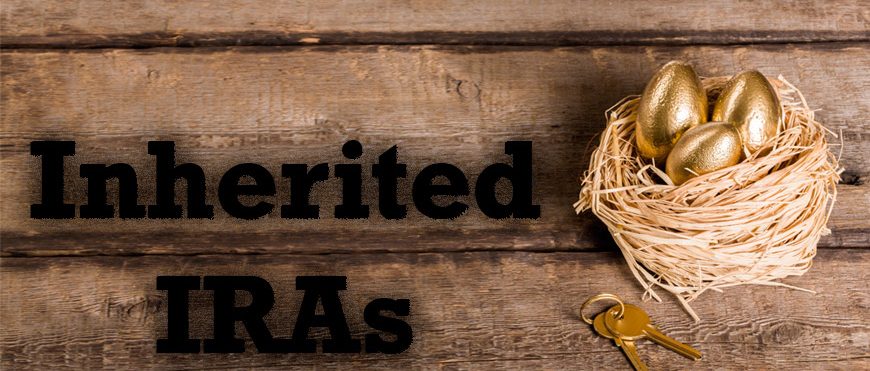What beneficiaries need to know and consider.
Provided by Marc Aarons @ Money Managers, Inc.
At first glance, the rules surrounding inherited IRAs are complex. Here are some questions (and potential answers) to consider if you have inherited one or may in the future.
Who was the original IRA owner? If the original owner was your spouse, you have a fundamental choice to make. You can roll over your late spouse’s IRA into an IRA you own, or you can treat it as an inherited IRA. If the original owner was not your spouse, you must treat the IRA for which you are named beneficiary as an inherited IRA.
What kind of IRA is it? It will either be a traditional IRA funded with pre-tax contributions or a Roth IRA funded with post-tax contributions.
Do you want to let the money grow and take RMDs or cash it all out now? In the case of a small IRA, many heirs just want to cash out – it seems bothersome to schedule tiny withdrawals out of the IRA across the remainder of their lifetimes. Money coming out of an inherited traditional IRA is taxable income, however – and if a lump sum is taken, the tax impact could be notable.
If the IRA is substantial, there is real merit in scheduling Required Minimum Distributions (RMDs) instead. This gives some of the still-invested IRA balance additional years to grow and compound. Any future growth will be tax deferred (traditional IRA) or tax free (Roth IRA).
Internal Revenue Service rules say that RMDs from inherited IRAs must begin by the end of the year following the year in which the original IRA owner died. These RMDs are required even for inherited Roth IRAs. Each RMD is considered regular, taxable income.
One asterisk is worth noting regarding inherited traditional IRAs. If the original IRA owner died on or after the date at which RMDs are required for that IRA, then you can schedule RMDs during the remainder of your lifetime using tables in I.R.S. Publication 590 as a guide. If the original IRA owner died before that date, you have a choice of scheduling RMDs over a lifetime or withdrawing the whole IRA balance by the end of the 5th year following the year of the original owner’s death.
What is the IRA’s basis? In other words, what is the amount on which the original IRA owner paid taxes? For an inherited traditional IRA, the basis equals the amount of all non-deductible contributions that the original IRA owner made. For an inherited Roth IRA, the basis equals the amount of total contributions made by the original owner.
When you know the basis, you can figure out the percentage of an RMD from an inherited traditional IRA that is subject to tax. RMDs out of inherited Roth IRAs are not normally taxed, but if the inherited Roth IRA is less than five years old, you must determine the basis. The Roth IRA’s basis will be distributed to you first, then the Roth IRA’s earnings, and only the earnings will be taxed. Earnings can be withdrawn tax free from an inherited Roth IRA starting on the first day of the fifth taxable year after the year the Roth IRA was first created.
Can you withdraw more than the RMD amount from an inherited IRA each year? Certainly, but keep in mind that a large, lump-sum payout could leave you in a higher tax bracket.
What happens when you inherit an inherited IRA? As a secondary beneficiary to that IRA, you assume the RMD schedule of the person who was the primary beneficiary.
Can you convert an inherited traditional IRA into a Roth IRA? The I.R.S. forbids this – with one exception. A spousal IRA heir who rolls over an inherited IRA balance into their own traditional IRA can arrange a Roth conversion.
If you have inherited an IRA, talk with a financial professional. That conversation may help you determine a tax-efficient way to manage and withdraw these assets.
Provided by: Marc Aarons, 714-887-8000 or marc@ocmoneymanagers.com
MMI Disclosures
Citations.
1 – forbes.com/sites/ashleaebeling/2017/07/10/what-to-do-if-you-inherit-an-ira/ [7/10/17]
2 – irs.gov/retirement-plans/required-minimum-distributions-for-ira-beneficiaries [8/17/17]
3 – fool.com/retirement/iras/2017/06/01/5-inherited-ira-rules-you-should-know-by-heart.aspx [6/1/17]
4 – finance.zacks.com/basis-inherited-iras-2711.html [10/12/17]
This material was prepared by MarketingPro, Inc., and does not necessarily represent the views of the presenting party, nor their affiliates. All information is believed to be from reliable sources; however we make no representation as to its completeness or accuracy. Please note – investing involves risk, and past performance is no guarantee of future results. The publisher is not engaged in rendering legal, accounting or other professional services. If assistance is needed, the reader is advised to engage the services of a competent professional. This information should not be construed as investment, tax or legal advice and may not be relied on for the purpose of avoiding any Federal tax penalty. This is neither a solicitation nor recommendation to purchase or sell any investment or insurance product or service, and should not be relied upon as such. All indices are unmanaged and are not illustrative of any particular investment.

Comments are closed